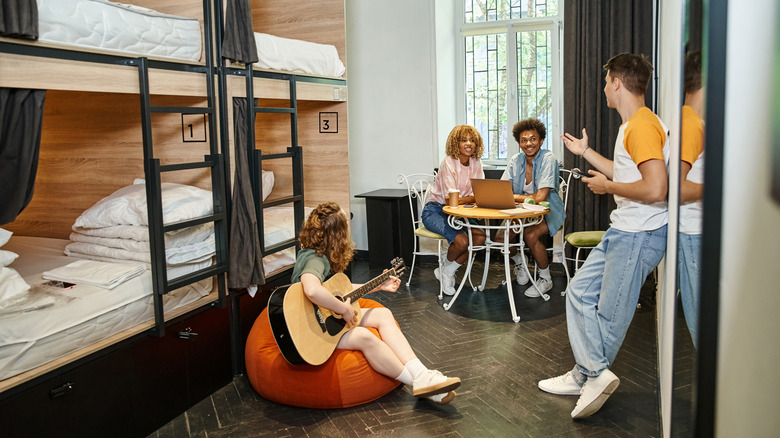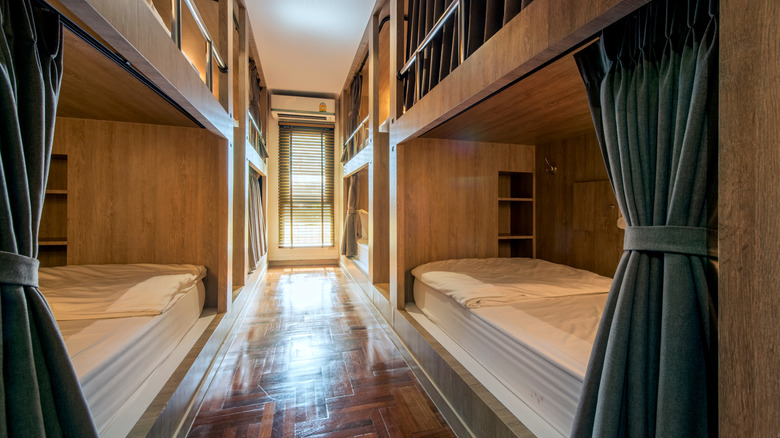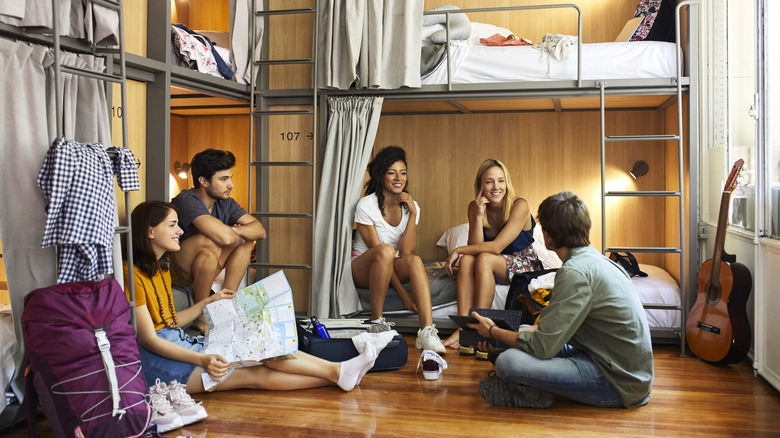What You Should Know Before Staying At A Hostel
If you've ever hesitated over the idea of staying in a hostel, picturing squeaky bunk beds, shared bathrooms, and sleepless nights, it's time to rethink it. Today's hostels are far more than the backpacker crash pads of old. They range from design-led boutique stays to social hubs where remote workers and travelers gather over coffee or rooftop yoga. Whether you're planning a solo trip, traveling with friends, or simply looking to stretch your budget without sacrificing experience, hostels can offer a unique mix of affordability, comfort, and community.
Still, first-timers often underestimate how varied these spaces can be — or how much a few small decisions (like room type, location, or timing) can shape your stay. This guide breaks it all down of what to expect, how to book smart, what to pack, and how to make the most of the people and places you'll encounter along the way. Drawing on expert advice, credible research, and first-hand experience from hostels across four continents, it's designed to give you everything you actually need to know before your first stay.
Forget what you think you know about hostels
Once the reserve of scruffy backpackers and budget travelers, today's hostels are a far cry from the basic bunk-bed dorms of decades past. Many have reinvented themselves as stylish spaces with flashy interiors, private rooms alongside the classic shared dorms, and curated social events. Some offer rooftop terraces, swimming pools, or co-working areas, while others feature art installations, yoga classes, and cafés that draw in locals as well as guests. This shift has even given rise to the so-called luxury hostel, a new generation of properties combining hotel-level design and amenities with the open, social spirit (and low prices) of traditional hosteling.
Across the world, this shift from basic to bougie has created a new breed of traveler, one that values connection and creativity as much as saving money. Hostels now attract a diverse mix of guests: digital nomads working remotely, solo travelers exploring new cities, and even older travelers looking for a more social experience than a standard hotel provides. In fact, the best hostels feel more like creative hubs than crash pads, offering all the essentials with a welcoming atmosphere that encourages interaction rather than intrusion. The result? A modern travel experience that's affordable, comfortable, and sociable — a reminder that shared spaces can still feel special.
The hostel spectrum: finding your fit
Choosing the right hostel isn't about luck; it's about knowing what kind of experience you want and reading the signs before you book. Start by deciding what matters most to you, like social atmosphere, calm, design, or long-term comfort, and use that as your filter when comparing options. The smartest approach is to open a few tabs side by side — one with a booking site to check prices and availability, another with the hostel's own website (which sometimes lists lower rates or perks like free breakfast), and a third with independent traveler reviews or blogs for candid insight. Comparing these sources next to one another gives you a more accurate picture than any single listing ever could.
Once you've narrowed your options, focus on what's included rather than just the base price. Two hostels charging the same nightly rate can differ widely once you factor in extras like towels, Wi-Fi, or lockers. Reading between the lines helps too. Language like "social," "community dinners," or "weekly pub crawls" signals a lively vibe, while "quiet," "boutique," or "co-living" suggests a calmer environment. The goal isn't to find the cheapest stay, but the one that matches your travel personality, whether that's late-night conversation or peaceful downtime.
What you'll actually get for your money
Hostels are still one of the best-value ways to travel, but price varies widely by region. The Hostelz Hostel Price Index 2025, which tracks the cheapest listed dorm prices across the globe, does show some clear patterns. In much of Southeast and South Asia, Eastern Europe, and parts of Latin America, entry-level beds frequently sit in the single-digit USD range; across large parts of Southern and Western Europe and East Asia, the teens to low-20s USD are common starting points; while Nordic countries and major North American hubs tend to have higher minimums. As with any type of accommodation, actual nightly rates rise with seasonality, room type, and demand.
What you actually get for your money depends on inclusions and amenities. Having stayed in many hostels around the world, I've found that most cover essentials like personal lockers (bring your own padlock), free Wi-Fi, shared bathrooms, and a communal lounge; while many also offer laundry (coin-op or prepaid), simple breakfasts or dinners, and organised socials such as walking tours or pub crawls. Tiered options matter, too. Bigger dorms generally cost less; smaller dorms, privates, or pod bunks cost more but can deliver better sleep, privacy, and security. From experience, paying a little extra for those small comforts often turns a place to crash into a place you actually enjoy, especially on longer trips.
Inside the building: layout and room types
Let's take a deeper dive into the types of rooms available at hostels today. The classic dorm room is still the most affordable, typically sleeping between four and twelve people, although you'll find much bigger dorms across the world too (I once slept in a 50-bed room in a hostel in Cambodia, true story). Mixed dorms suit those keen to meet others, while female-only dorms offer added privacy and security for solo travelers. Increasingly, modern dorms feature privacy curtains, reading lights, and USB charging points, while pod- or capsule-style bunks, inspired by Japan's capsule hotels, provide semi-private sleep spaces that feel sleek rather than cramped. Some hostels even turn dorms into experiences, with giant hammocks in Colombia, cave rooms in Turkey, or converted train carriages in South Africa.
For travelers who prefer more solitude, private rooms bridge the gap between hostels and hotels. You'll find twin rooms for friends, double rooms for couples, and ensuite options with private bathrooms. Many go beyond the basics, too — from beach bungalows to themed rooms that take decor to a whole new level. A few hostels even offer unusual private stays, like cabins under the stars in Scotland or even this secret 'floating hostel' for cruising Patagonia's breathtaking fjords. Whether you're sharing or upgrading, the key is to match your comfort level and travel style. Today's hostels make it possible to find both community and personal space, without leaving the budget-travel world behind.
Book smart: reading between the lines of reviews
Hostel reviews are one of the best tools for making an informed booking, but only if you know how to read them properly. Instead of just focusing on overall ratings, look for patterns in the comments. If several travelers mention thin walls, cramped bathrooms, or patchy Wi-Fi, that's almost always accurate. A single bad review, on the other hand, might just reflect a one-off experience. Scanning both the most recent and oldest reviews helps you spot whether problems have been resolved or are ongoing.
Prioritize specific details over vague impressions. words like "clean," "secure," or "friendly staff" carry more weight than "amazing" or "terrible." Reviews from travelers similar to you (solo visitors, digital nomads, couples) are especially useful, since expectations differ. If a hostel describes itself as "social," cross-check reviews to see whether that means organised activities or late-night parties. The savviest travelers treat reviews like clues rather than conclusions, weighing tone, frequency, and recency together to build a realistic picture. The goal isn't perfection; it's to find a hostel that matches your comfort level, priorities, and pace.
Location, location, location
Location can quietly make or break your hostel experience. A cheap dorm on the city outskirts might look like a bargain until you're spending half your day (and budget) on transport. In contrast, a slightly pricier central option often pays for itself in saved time, easy walks, and access to food, nightlife, and public transport. The trick is to understand a city's layout before you book. One of the best tools for that is hiding in plain sight: Google's 'Where to stay' tool.
Start at Google Travel, enter your destination and travel dates, then click the "Where to Stay" button. This brings up a surprisingly detailed neighborhood guide showing average nightly rates, short descriptions of each area, and an overall location score. It's an excellent way to visualize which districts best match your plans and budget before even opening a booking site. From there, switch on the "Hostel" filter to narrow results to budget-friendly stays only — you'll instantly see which neighborhoods offer affordable, well-rated hostels in convenient locations. Think of it as digital reconnaissance, as you're not just finding a bed, you're learning the lay of the land. A few minutes exploring the map can save you hours of frustration once you arrive.
Are hostels safe?
Safety in hostels isn't about being on edge; it's about being prepared so you can relax and enjoy the experience. Many modern hostels take security seriously, with keycard access, CCTV, 24-hour reception, and lockers for valuables. Still, it's worth scanning reviews for repeated mentions of lost items, poor lighting, or non-locking dorm doors — small clues that tell you more than a star rating ever could. In my experience staying in hostels across four continents, the safest ones are those where staff are visible and proactive, not just polite.
If you're travelling solo, especially as a woman, consider hostels with female-only dorms or coded access rooms. Organizations like Hostelgeeks and the Solo Female Travelers Club keep updated lists of vetted, safety-focused properties that balance comfort with community. A few smart habits go a long way, too. Bring your own padlock, keep essentials zipped up in daypacks, and avoid leaving electronics charging unattended overnight. Ultimately, the goal isn't to travel fearfully, but confidently. These genius tips for keeping your belongings safe while backpacking can also help with that.
Packing like a pro-traveler
Packing for a hostel stay is a balancing act. You want to travel light but still have the essentials that make shared living easier — something these game-changing packing hacks can help with. But what should you not leave at home? A few practical items can transform your stay: think a padlock for your locker, a quick-dry towel, and flip-flops for showers. A sleep mask and earplugs are invaluable in dorms where someone's always coming in late or rustling through bags at dawn. A power bank and multi-port adapter also go a long way, since plug sockets can sometimes be in short supply.
Beyond the basics, bring small comforts that make a big difference, such as a microfibre sheet or sleeping bag liner for hostels that only provide bedding for an additional cost, packing cubes for staying organized, and a reusable water bottle to cut down on plastic waste. If you're on the road long-term, a laundry bag and portable clothesline will save you time and money — many hostels I've stayed in have washing machines, but rarely dryers. One thing you don't need? Excess. In my experience, the lighter your pack, the freer you feel. Hostels tend to have everything you've forgotten, or someone friendly enough to lend it to you. Travelling light isn't just about weight; it's about flexibility.
How to connect: making friends without the awkwardness
Not only is taking a solo journey good for your mental health and scientifically proven to make you a nicer person, but solo travel can also be life-changing for hardcore introverts. That doesn't mean, however, that you shouldn't be up for meeting new people and experiencing new places together. Many hostels build social opportunities into their setup: Regular events like pub crawls, karaoke nights, walking tours, yoga sessions, or group dinners are designed to bring people together. These shared experiences give you natural conversation starters and something to bond over. If you're a bit shy, you're not alone, and many hostels make it easier. Hostelworld advises joining the hostel's group chat (via their app) even before you arrive. Saying something as simple as, "Anyone up for dinner tonight?" can help break the ice and set you up with a plan before you've even checked in.
Once you're there, common rooms, kitchens, and lounges are social gold mines. Being present, open, and available in those spaces increases the chances of casual chats. Don't pressure yourself to be the life of the party, though. Even introverts blend in by attending one social event and being genuinely curious. The most meaningful connections often grow from low-stakes gestures, not forced networking. Ultimately, remember that most people check into hostels for some form of socialisation, not just for cheap rates, so it's likely almost everyone will be open to chatting and making new friends.
Staying clean and comfortable
Hygiene in shared hostels is entirely manageable, and with a few habits and smart tools, you can treat even dorm-style living like a personal retreat. Start with shower etiquette: keep your shower time short, use flip-flops or shower shoes, soap down surfaces after use, and never leave personal items blocking access. Bring disinfectant wipes or a small spray to sanitize high-touch surfaces like sink faucet handles, shower stall doors, and countertops, especially in bathrooms used by multiple people. The CDC's cleaning recommendations for shared lodgings support this practice, advising travelers to disinfect surfaces before touching them.
In shared kitchens, label your food, clean utensils promptly after use, and use your own containers where possible. Avoid cross-contamination by never preparing raw meat on communal surfaces without wiping them down first. Dorms often mean shared noise, light, and movement. To protect your sleep quality, use earplugs, a sleep mask, and consider a white noise app. If possible, book lower bunks or drawers near the wall to reduce exposure to foot traffic. Use a sleep liner or personal pillowcase for extra hygiene control. From personal experience, having small comforts such as a clean sleep setup, the ability to sanitize your space, and thoughtful use of shared facilities makes noisy, busy dorm nights feel far more restful.
Co-working spaces
Gone are the days when hostels were strictly for backpackers on shoestring budgets. Many now double as creative hubs for remote workers, and properties with reliable high-speed Wi-Fi, dedicated work zones, and abundant charging ports have become increasingly common, particularly in Europe and Southeast Asia. These hostels aren't just adding a few desks; many feature open-plan coworking lounges, ergonomic chairs, and quiet rooms designed for focus. Work-friendly hostels are on the rise, with properties such as ProjectBay in Germany, YellowSquare in Rome, and Stay 424 in Chicago being just a few examples of hostels with dedicated coworking zones for remote professionals, blurring the line between accommodation and workspace. This shift reflects a wider trend: As flexible work and travel continue to merge, hostels are becoming a preferred co-living choice for young professionals, offering an affordable, community-driven alternative to traditional leases, or indeed, lifestyle.
The booking game: when, where, and how to save
Timing and strategy can make the difference between a cramped dorm in the back or your pick of beds, and significantly affect your wallet. Early booking (1–2 months ahead) is especially wise in popular destinations or peak season, where the best hostels often fill fast. Hostels typically release beds well in advance, but spontaneity still has its place. Many hostels maintain some inventory until just before check-in and may drop prices to fill empty beds, especially midweek. But you'll often risk landing in a large dorm, getting bumped to a less desirable room, or missing out on private rooms, which are usually limited in number.
Wise travelers often book their first few nights ahead, particularly the arrival city, to avoid late-evening stress. Then, as you move onward, you can mix in flexibility, snagging deals a few days out while keeping your core stays locked down. Booking directly with hostels sometimes yields better perks (free cancellations, included amenities) or lower rates, since they avoid commission fees. Oh, and always keep an eye on local holidays, festivals, and events, which can drive demand and raise prices well ahead of time. In those cases, booking 6 to12 months in advance might be your only real option.
Methodology
This feature combines extensive first-hand experience with careful research from trusted travel and lifestyle sources. Over the past decade, I've stayed in dozens of hostels across South America, Southeast Asia, Europe, Australia, and the United States, from remote jungle lodges and seaside co-living spaces to high-tech capsule pods in major cities. That range of experiences means I know what actually matters once you check in: how comfort, safety, and atmosphere vary from place to place, and which small details make all the difference. Every recommendation and insight was cross-checked against multiple up-to-date sources to ensure accuracy and relevance. Rather than relying on generic overused advice, this guide focuses on real takeaways and the practical lessons that come from lived experience, not just online consensus.













